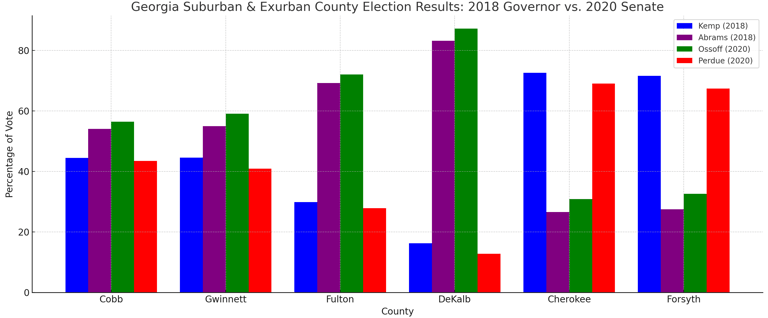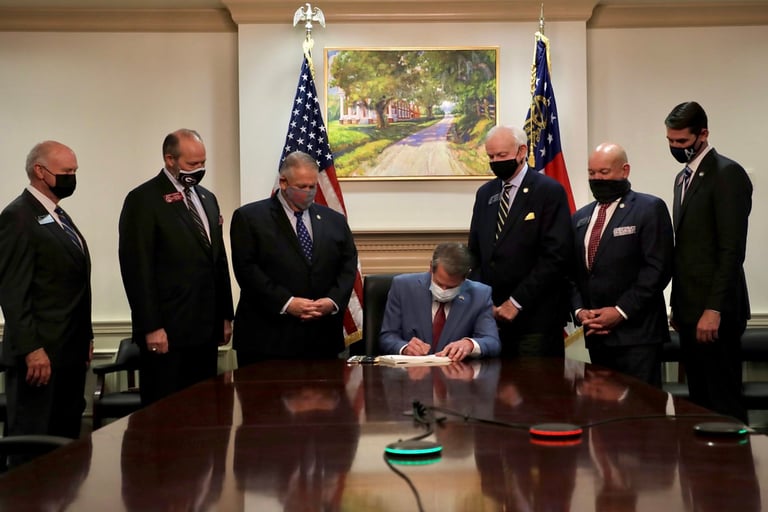Only the best information from the Poolside politician himself
Why Brian Kemp is the GOP's Best Bet for Georgia’s Senate Seat in 2026
Examining the 2026 Georgia Senate Race.
The Poolside Poltician
3/8/20256 min read


We are still early into the second Trump administration, with the 2026 midterms still a long ways away. There will be plenty of key races that will shake out, but one race is already abundantly clear that it will be crucial for Republicans to expand their majority, which is in the Peach state.
This Senate race presents itself as arguably the best pickup opportunity for Republicans on the 2026 map.
The main reason that Georgia would be so appetizing is if their current Governor, Brian Kemp, gives the Senate a shot.
Brian Kemp, Georgia’s incumbent governor since 2019, has built a political career that should make him appealing to Peach State voters. Before becoming governor, he served as Secretary of State (2010–2018) and a state senator (2003–2007), gaining valuable experience along the way.
More recently, in his tenure as Governor, Kemp has been faced with several challenges that have shown his capable leadership abilities. Take the COVID-19 Pandemic for example, in April 2020, Governor Kemp made the bold decision to reopen Georgia's economy earlier than many other states. This move aimed to balance public health concerns with economic stability, reflecting his commitment to the livelihoods of Georgians. Despite facing criticism, including from then-President Donald Trump, Kemp stood by his decision, emphasizing the importance of listening to the needs of hard working citizens.
Under Governor Kemp’s leadership, Georgia has been consistently recognized as a top state for business, attracting new industries and creating job opportunities. He has prioritized education by committing billions in funding for K-12 schools, enhancing safety, and addressing the teacher shortage through higher pay and reduced bureaucratic barriers. Kemp has also championed legal reforms to limit frivolous lawsuits, strengthening the state’s business climate. His administration has made significant infrastructure investments to support Georgia’s growing economy and improve statewide development. With a proven track record of economic growth, education reform, and pro-business policies, Kemp has demonstrated the leadership needed to effectively represent Georgia in the U.S. Senate.
We all know that winning is what matters in elections, and Mr. Kemp has an impressive record in the past six years of winning elections. In the 2018 gubernatorial election, in what was a hostile national environment for Republicans, Kemp held off progressive superstar Stacey Abrams, who was the former minority leader in the Georgia state house and was backed by Oprah Winfrey. The election was tight- and he won by 1.39%, around 55,000 raw votes.
During his reelection campaign, Kemp faced a primary challenge from former Georgia Senator David Perdue- also the nephew of former agriculture secretary Sonny Perdue. The primary election was not even competetive- with Kemp eviscerating Perdue by nearly 52% and around 626,000 raw votes. In the general election, Kemp once again faced off against Abrams, winning by a more comfortable margin this time- around 8 percentage points.
Now, in today’s politics, many politicians lack credible crossover appeal to expand their voting electorate, but Kemp has done just that. Following Joe Biden’s narrow victory in the Peach state in the 2020 election, Kemp and Georgia Secretary of State Brad Raffensperger faced severe pressure from President Trump to “find” 11,780 votes, and declare him the winner of Georgia. Both men were left with a huge political and moral dilemma- and both men ultimately made the right decision- bucking the President even with public harassment and calls to resign. Democrats spent a chunk of their 2024 campaign messaging on wanting to protect democracy- if Dems are serious about preserving Democracy, they should vote for Brian Kemp as he is a perfect example of someone who values each voters’ voices and will preserve democracy for all!
*Important context, the 2022 primary challenge from David Perdue was funded and supported by President Trump and his closest allies, attempting to get back at Kemp over what they thought was a betrayal to the President in the 2020 election. Kemp’s large victory over Perdue shows his ability to craft his own voter base and political brand separate from the national party.
Sticking on the topic of election integrity, the Governor also implemented the Election Integrity Act of 2021, which reformed Georgia’s election system. The law introduced several key changes to Georgia's election process. It replaced signature matching for absentee ballots with a more standardized identification requirement, requiring voters to provide a driver's license or state ID number, the last four digits of their Social Security number, or a photocopy of an accepted form of identification when requesting an absentee ballot. Ballot drop boxes were officially codified but placed under new restrictions, limiting their number based on registered voters or voting locations and requiring them to be located indoors at early voting sites, accessible only during polling hours. At the same time, the law expanded in-person early voting, adding a mandatory Saturday and formally allowing Sunday voting hours, increasing the total number of early voting days available to Georgians.
And how could anyone forget this gem: In tune with national conservative rhetoric, Kemp gained widespread attention with an incredibly popular ad where he promised to personally round up illegal immigrants, showcasing his tough stance on illegal immigration.
Brian Kemp is only half of the pie in this equation, it is important to now examine the incumbent Senator, Jon Ossoff. For starters, Ossoff gained national attention when running for GA-07 in the 2018 midterms, losing in a runoff ultimately. Ossoff tried his luck again in running for Congress in the 2020 Senate cycle, challenging incumbent Senator David Perdue. In what was a competitive race, Ossoff forced a runoff and defeated the incumbent senator on Jan 5, 2021.
Since becoming a Senator in 2021, Ossoff primarily voted with Joe Biden and liberal Senators Bernie Sanders, Elizabeth Warren 97% of the time. Given Georgia’s status as a swing state, that is far too high.
Given that Osoff has found himself in competitive elections in his past, we should be aware that he is likely prepared to face another tough challenge in his 2026 reelection.
Governor Kemp and Senator Ossoff each have their own political base of support (rural for Kemp, and urban for Ossoff) but both fare well when it comes to moderate voters in the all important Atlanta suburbs, which is almost certainly where this race will be decided. Additionally, we will examine some exurban counties to show the strengths of each candidate also. The six counties listed: Cobb, Gwinnett, Fulton, DeKalb, Cherokee, and Forsyth. We can group these counties into three mini groups, urban counties (Fulton and DeKalb) suburban countries (Cobb and Gwinnett) and exurban counties (Cherokee and Forsyth)
As you can see in the chart, both Kemp and Ossoff each fared better than their same-party counterparts in the opposite election. These sight trends alone were enough to capture victory statewide.
Electorally, the most troubling and concerning trend for Republicans is the medium to large shift to the left that suburban Atlanta counties had in the 2024 Presidential Election versus the 2020 Presidential Election. The following counties are troubling in particular based off their 2024 Presidential Election results: Douglas (6.3% more democratic than in 2020) Rockdale (6.7% more democratic than in 2020) Henry 9.2% more democratic than in 2020). The reason why we are expressing concern is that many metropolitan areas such as Los Angeles, Chicago, and New York City all saw significant rightward swings. Another frightening state for the Georgia GOP: Kamala Harris improved on Joe Biden’s 2020 raw vote margin by over 74,000 votes.
While a Kemp candidacy is not a guaranteed path to the nomination, it would likely avoid the risk of a contentious primary. His strong popularity as Governor could deter potential challengers, leading other candidates to either refrain from entering the race or drop out, thereby preventing a divisive GOP primary. This would allow Kemp to avoid the risks of internal party conflict and enter the general election without the typical damage that a prolonged, messy primary contest can cause.
In conclusion, if the national GOP wants to send Liberal Democrat Jon Ossoff packing, they will urge Governor Kemp to seek the nomination for Georgia Senate in the 2026 midterms.








